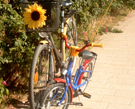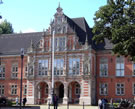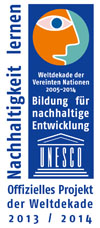Klimaportal der Lokalen Agenda 21 im Raum Harburg
Social issues
Our common (local and global) well-being depends on the balance between ecological integrity, economic viability and social equity. Social unrest is predominantly caused by poverty, hunger, no access to clean water or health care, human rights violations etc.
Solidarity and empathy are indispensable ingredients of the Agenda 21 process if it is to facilitate human prosperity and natural well-being in a just and peaceful world today and tomorrow.
In Harburg, many people and organizations are dedicated to social fairness in their direct surroundings. You could become a part of this process, too. Read (soon) more about them by clicking on the respective links below. Contact us, if you wish to communicate your own ideas, activities etc here.
Read about projects & initiatives covering ...
> Global Justice > Food Security > Eradication of poverty > Fair Trade
> Exchange Trading > Free Shopping > Help and fun for school children
> Voluntary Work
Global Justice
The Harburg-Heimfeld Working Group for Global Justice (Arbeitskreis Gerechte Globalisierung Heimfeld) consisted of 10 local Christians. They basically shared the view of the Global Justice Movement that a fair globalisation, ie to the benefit of all people, is (a) key to a viable and thus peaceful future and (b) possible through the equal distribution of economic resources.
The working group focused on Christian alternatives to the prevalent neo-liberal economic system with its greed-driven orientation towards maximum profit. They promoted Fairtrade as a suitable step towards global justice, ie social equity and ecological integrity. Furthermore, the group looked for further ideas on feasible measures to achieve the Millennium Development Goals (MDGs). The group ceased its work in 2011.
Contact details:
St. Petrus Gemeinde, Haakestraße 100, 21075 Hamburg,
Homepage: http://www.petrus-heimfeld.de/kontakt/
To learn more about Global Justice, follow the links collection here.
Food Security
In a concerted action, the Hamburg-Heimfeld Working Group for Global Justice, the Harburg World Shop and HARBURG21 supported the signature campaign "Global dining partners" (Weltweite Tischgemeinschaft) run by Bread for the World (Brot fuer die Welt) in 2008 and 2009. The aim is to remind den incumbent German Chancellor of Germany's commitment to eradicating hunger and poverty by 2015 (one of the Millennium Developmental Goals) with a paper chain made of thousands of signed paper figures. This signature campaign ends on 16. October 2009, the World Food Day. Addtionally, locals were invited to join an eco-fair lunch after Sunday mass on 28. September 2008. Click here for details.
Eradication of poverty
In support of the United Nations Millennium Campaign "End poverty by 2015", HARBURG21 and the focal group Transport21 (AG Verkehr21) joined forces and staged for a public gathering in front of the local townhall. A few days after the World Food Day 2007, a group of 30 people showed a banner reading "No excuse. Stand up against poverty". Next time we are to repeat this action we would like you to join in!
The message is addressed to all the goverments who committed themselves to the eight most pressing Millennium Developmental Goals (MDG) ) at the UN Millennium Summit in September 2000.
Fair Trade
Background
In essence, "Fair trade" is the ethical trading and marketing of goods, for instance, bananas, chocolate, coffee, tea, sugar, mangos, spices, cotton, which have been produced (often under abysmal conditions) in economically less developed countries and exported to the western world. Aiming to improve the social and environmental situation of so-called marginalized South American, African and Asian producers (usually small family businesses), ethical or social trading adheres to the motto (coined in the 1960's): "Trade, not Aid". Fair trading constitutes a transparent, respectful, equity-generating social partnership between disadvantaged producers/workers and traders.
Fair traders ensure that (a) reasonable wages are paid as well as (b) investments are made via paying higher purchase prices (than the usually maximum-profit-generating low prices), (c) safe and healthy and equal working conditions are created, (d) child labour and slavery are abolished and (e) eco-friendly production processes are implemented. In this way, the producers/workers can become self-efficient and economically independent from official developmental aid. Also, they can improve their well-being and access education, move towards gender equality (cf. the Millennium Developmental Goals MDGs) etc.
Goods that have been produced according to the ethical (and increasingly also to) ecological standards carry a Fair Trade Certification Mark (eg. TransFair's "Fairtrade" label). In general, such products are sold by local world shops but supermarkets and food discounters do offer a small range of such goods, too.
More information about Fairtrade hold the links listed here. Download our flyers on Social labels & marks and Eco-fair labels here.
Local Projects:
Our local worldshop, set up and run by a handful of volunteers that can do with extra help from you, offers certified food, handcrafts as well as background information on the fair trade movement, market shares and the like. So, here is your chance to purchse fair sweets and spices, (dried) fruits and nuts and rice, wine, crafts and art etc:
Weltladen Harburg, Julius-Ludowieg-Straße 9, 21073 Hamburg
Phone.: +49 40 67 95 36 49, Web: www.weltladen.de/harburg, E-Mail: welaha@gmx.net
Shop manager: Mrs. Birgit Podendorf, welaha(at)gmx.net
Open: Tuesdays to Fridays 10 a.m. - 6 p.m. and Saturdays 10a.m. - 2 p.m.
Neugraben fairaendern: In Juni 2011, another project in support of more fair trade in Hamburg's south has been launched: Fair trade in Neugraben (Neugraben fairaendern). Read more about this initiative here(in our News section).
Exchange Trading System
The Harburg Exchange Trading System (HETS) has been in operation since the mid nineties. It follows the LETS (Local Exchange Trading System) principles:
LETS networks have their own currency, so-called LETS units, which are often time-related points systems such as the German "Talente" (talents) or the London“ Locks". Anyone on this scheme can trade abilities, skills, goods or services within the network. The "supplier" receives a credit note (or LETS c heck) from the debited "receiver" and is free to spend her/his credits with any other member of the network. The system's accountant keeps an account for each network member and records their individual transactions, ie their credits (= earnings) and debits (expenditures).
LETS support a sustainable community life in several ways:
(1) They create social equity: Whatever your age, educational and social background, income, abilities and skills, anyone is welcome to join the local exchange trading network and trade with anyone on the scheme. In this way, especially members with little money at their disposal have now access to products or help they could otherwise not afford. Also, whether you cut somebody's lawn or create a website does not matter with respect to your "earnings", due to a standard rate agreed to ensure equal pay.
(2) They strengthen social ties within the communities, as they reduce both the anonymity typical for urban life and the isolation that often comes with unemployment and handicap.
(3) They help reduce the environmental burden of urban life by cutting down energy-consumption and CO2 emissions. Obviously, local exchange does not necessitate long distance transportation. Also, trading repair services is a better opiton than simply dumping every thing that is out of order.
In January 2012, the Harburg Exchange Trading System (HETS) underwent some structural changes and combined forces with Harburg's "Free Shopping" initiative. Since then, every member of Harburg's ETS is granted 2 hours per months without any exchange activities - just like an unconditionally paid "basic income".
Contact details: see below (Free Shopping)
Tauschring Harburg
Phone: +49 40
Fax: + +49 40 55 61 02 08
E-Mail: post(at)umsonstladen-harburg.de
Homepage: http://www.umsonstladen-harburg.de/tauschring-harburg/index.php.
For more information about LETS follow the links collected here.
Free Shopping
Since April 2009, "Free Shopping" is possible in Harburg. At Harburg's Free Shopping Store "Give 'N Take" (Umsonstladen Harburg "geben & nehmen") everybody is welcome to either donate anything they can dispose of (if it is clean, intact and complete) and/or take home things (3 pieces per person!) they are in need of but cannot afford to buy. This is a very simple method of supporting a socio-economic and environmentally healthy development by reducing environmental pollution through waste and by improving the lives of locals with a small income. The shop is run by a group of volunteers. Helping hands, donations and financial support are welcome.
Here is where, when and what you can leave or pick up free of charge:
Umsonstladen Harburg "geben & nehmen", Nobleéstrasse 13a, 21075 Hamburg
- nearest Rapid Train Station (S-Bahnhof): Harburg-Heimfeld)
Phone: +4940-23 81 53 69 (during opening hours)
Open: Tuesdays 10 a.m. - 12 p.m. and 4 - 6 p.m, Wednesdays 10 a.m. - 12 p.m. and 5-8 p.m, Fridays 4-7 p.m., Saturdays 3-5 p.m.
Range of goods:
Books, CDs, DVDs, video cassettes, records, household equipment, small electrical appliances, toys, scooters, furniture for kids, lamps, mirrors, small shelves) and many more ....
Contact details: E-mail: post@Umsonstladen-Harburg.de, www.Umsonstladen-Harburg.de (in German), phone: Tel. 0176/32 85 91 14
Learn more about "Free Gift Shops" here.
Help and fun for school children
Especially children from low income families come here for a healthy lunch, to get help with their homework and take part in creative activities and sports.
Contact details: Kennedy Haus, Kalischerstraße, 21073 Hamburg
Voluntary Work
Between 2004 and 2009, anyone interested in voluntary work in the Harburg area could turn to the Volunteers Forum of Harburg for competent advice. Up to now, almost 100 people have been placed with many socially, environmentally or culturally oriented non-profit organizations. Now, the Harburg Voluntary Market caters brings together interested people and institutions looking for voluntary workers.
Also, since June 2011, the Harburg Voluntary Network (Freiwilligen Netzwerk Harburg) has taken on the job of finding and placing Harburgers looking for voluntary jobs.
cb






